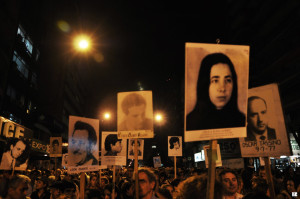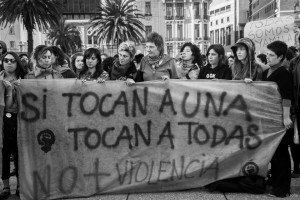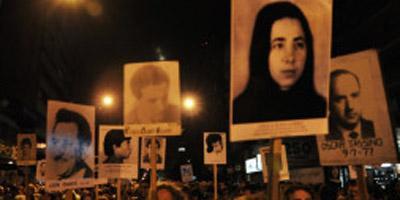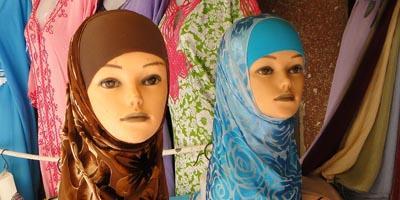
Fifty years ago, Beatriz Benzano was a member of Uruguay’s militant leftist Tupamaros. The Tupamaros, made up predominately by middle-class youth, sought to redress the country’s rising rates of inflation, unemployment, and bureaucratic corruption through violent insurrection. In 1972, Benzano was captured by state forces and confined in Punta de Rieles Prison for four years.
She recounted her prison experience in a lecture to the Faculty of Law at the University of the Republic in 2014, in which she spoke about the degradation she and her fellow female dissidents were subjected to. “Forced nudity, exposed to the gaze of troops and officers; fondling and groping; degrading and offensive insults; the violation of one’s body, again and again, with sticks or bugs, with electric prods on the genitals, and with huge dogs snooping the breasts and genitals.”
The Dark Years
Benzano’s capture was part of a broader war carried out by the Uruguayan military against leftist movements it deemed subversive and destabilizing. Shortly after the crackdown, the military launched a coup, establishing a civic-military dictatorship that would last twelve years.
Approximately twenty-eight per cent of the political prisoners during this period were women, most in their twenties. Like their male counterparts, they were dissenting from an oppressive, authoritarian regime but, unlike their male counterparts, they were also transgressing gender roles by taking a political stance. As a result, their punishment was tailored to address their additional social crime; guards shamed and abused them for abandoning their duties as wives, mothers, and homemakers.
Punta de Rieles Prison would absorb a total of 739 women who continue to endure lasting physical and psychological scars in silence and isolation including, as Benzano told the university audience, “nightmares, anxiety, anguish, difficulties in their sex life, and gastric and intestinal problems.”
Although many male prisoners also suffered sexual violence, Benzano believes that women were specifically targeted “to make our bodies the spoils of war.” As a way of asserting the military’s patriarchal authority, women were often raped in front of their husbands, children, and parents.
This patriarchal culture, embraced and espoused by the dictatorship, continues to characterize any meaningful attempt to confront this period of Uruguay’s past. Benzano captures this culture with her story of a father who “asked again and again if her daughter had been raped, not because he cared what she had suffered, but only to know if his honour as a father had been sullied.”
Overcoming Impunity

Florencia Retamosa is a lawyer with the Luz Observatorio, an organization that aims to track, promote, and expose the prosecution of dictatorship-era abuses. By e-mail, she said that although the crimes committed in the last Uruguayan dictatorship were not gender neutral, the country has failed to acknowledge the difference.
“Much impunity exists for all crimes committed during the dictatorship,” she said. “But sexual offences in particular have been made invisible both by society and by the Uruguayan state, particularly the judiciary.”
Dr. Flor de María Meza, a professor of Human Rights and Gender Inequality at the University of the Republic, agrees. “All operators who work in the justice system have stereotypes and prejudices about the position of women in society.”
For example, a 2009 law allowing reparations for victims of illegitimate state action between 1968 and 1985 failed to specify sexual violence as a crime committed by state actors.
As of 2015, sixteen criminal prosecutions were unfolding with regard to victims of state disappearances or murder (even though “aggravated homicide” is the official label used, shirking state responsibility). No one, however, has been prosecuted for the crimes of sexual violence.
In 2011, twenty-eight women, including Benzano, testified to having suffered torture and sexual violence at the hands of both civic and military collaborators in state prisons like Punta de Rieles. But in April 2016, Judge Julia Staricco found the accused guilty of “deprivation of liberty.” She made reference to the crimes of sexual violence, but did not include them in her final ruling.
The omission was denounced by the Observatorio in a statement, saying that “It is essential that these considerations appear in court decisions because the perpetrators must be punished for what they really did… By not condemning the violence against women detained during the period of state terrorism in Uruguay, [the judiciary] is sending the message that violence against women is tolerated; promoting its perpetuation and social acceptance.”
Persistent Inequality
The experience of these twenty-eight women, and their ongoing struggle for truth and justice, reflects the broader struggle of Uruguayan women today to live lives free of prejudice and violence. One in three Uruguayan women reported experiencing domestic violence at some point in their lives, according to a 2013 National Report. In February of last year, the United Nations warned Uruguay over a rise in gender-based violence – thirty-five case of femicide were reported in 2015. Also significant is the fact that, compared to other Latin American countries, Uruguay has a very low level of female political participation at about 11%.
Right now, though, the Uruguayan government seems to be trying to counter gender inequality without confronting its own record of gender-based violence. President Vazquez established a Truth & Justice Commission last year, but, according to María-Meza, it is limited in both resources and mandate, with an overall lack of transparency. “It is a small group of five or so members” she said. “The people do not know about the work of this Commission, there is no information, and they have made no known advances.”
In addition, María-Meza notes that many of the perpetrators are known only through their military nicknames, and the current Minister of Defence rejects the feasibility and desirability of an investigation that would reveal their true identities.
Such a position is antithetical to Uruguayan democracy, María-Meza says. “It is necessary, for a healthy society, that people know the truth. A people who cannot remember are a people who cannot live in peace.”



